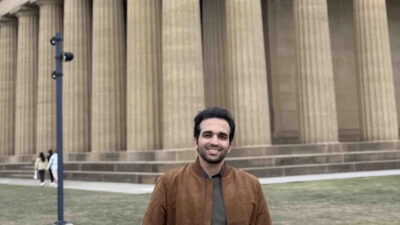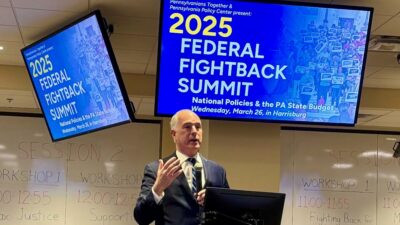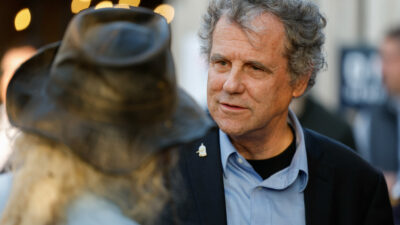In the emotionally fueled, clickbait-heavy campus culture of today, people are constantly insisting that I have an opinion.

You’ve seen it a million times: “Watch this 15-second clip and agree with our (supposedly) superior opinion, or else you hate everything good in the world!”
As a current college student, I have struggled with feeling forced into having an opinion, the feeling of guilt for not having one, and, sometimes, the shame from seemingly everyone in my orbit. The lack of complete information, coupled with emotionally charged pieces coming from the mass and social media, are a source of frustration and remain a problematic and systemic cause of angst and stress in an already digitally complex life. This is vexing, as countless times, I’ve been told by my parents’ generation that these are to be the best four years of my life.
Perhaps no issue is more prevalent today on campus than the ongoing conflict in the Middle East. When the professors at my college issued a statement condemning Hamas for its attacks on Israel, I found I lacked the background information necessary for a full understanding of the conflict.
The news media only fueled my confusion with its biased, and, sometimes, conflicting information, making it challenging to sort false information from fact. To understand the conflict, I delved into extensive and intensive research — aiming not to form an opinion, but merely to understand the context for the conflict. I actively sought information from professors, news articles, historical accounts, and informative essays to further enhance my understanding. I learned quickly that I had to fight for an objective understanding of the situation, and actively work to keep it unbiased.
For some, college is where you begin to shape what kind of adult you’ll become — how to be a thoughtful and critical thinker. As a student, I am constantly learning and discovering what I can about the current political environment.
I’ve learned that I am more inclined to explore varying questions and considerations than to stand on one side, because there is still a lot I am trying to understand. The collegiate environment, coupled with a polarizing information flow from available platforms and emotionally charged peers, has made me hesitant to question or discuss these issues openly.
On college campuses, perhaps even more than other places in America, diversity of opinion is growing sparse in the face of niche group interests and politics.
I feel like I can only discuss “hot-button” issues with someone if neither of us has a strong issue about the subject, and in this current climate, that’s virtually impossible. The fear of being judged or labeled a “bad person” has hindered my freedom to engage in meaningful political discourse.
The past decade has shown the power of mass communications to rapidly migrate from broadcast media to digital communications via social networks. As a nascent form of artificial intelligence, social networks have been designed to amplify and reward anonymous agents by monetizing viewer attention scores, regardless of how they are actualized via misleading information, harmful content, or sensationalism. Multiple live streams of this kind of content have compounded the increasing polarization within the government, misinformation, ideology marketing, conformance to “groupthink,” while at the same time decreasing attention spans. All of this occurs alongside the tragic withdrawal of independent thought and inquiry.
I recently read that the researchers at Princeton University have identified the double-edged sword of this phenomenon, with over-polarization on one side, and loss of diverse, independent thought on the other. This poses a problem: While polarization fuels division between groups, each group promotes its own agenda at the expense of the public good. In fact, researchers have determined that contrary to polarization, diversity is required for social systems, such as the system of democracy, to survive.
On college campuses, perhaps even more than other places in America, diversity of opinion is growing sparse in the face of niche group interests and politics. With the advancement of social media, the social climate in this country grows increasingly polarized. Large issues and vital pieces of information are relayed through brief news articles or 15- to 30-second media clips, usually found on platforms that an algorithm determined is best for “your way of thinking,” further diminishing the ability to receive information objectively.
Navigating the discourse surrounding the marriage rights bill, particularly in the context of same-sex marriage, has been a challenge for me. Growing up in a nondenominational Christian environment, I was unequivocally taught that same-sex marriage was deemed wrong and went against biblical principles, marking it as a significant transgression.
However, when I arrived at college, I discovered that the prevailing belief to be the exact opposite of this. The dominant sentiment was very much in acceptance and support for same-sex marriage.
In the absence of respectful discourse, the fostering of independent thought, and a shared goal of seeking solutions in the interest of the majority, we risk losing the core aspect of Unity in the United States of America
Despite the fact that I had not yet made up my own opinion on the matter, it became obvious to me that asking my peers or professors questions on this matter would mean exposing myself to the risk of being labeled as “homophobic” or “over judgmental.” Furthermore, if I asked my high school friends or family about it, I risked being perceived as a hopelessly confused and corrupted Christian. As such, I have struggled with a dilemma emerging from the fear of personally offending someone’s identity, being labeled negatively, or simply losing friends.
The enormity of the topic, coupled with the passionate emotions it tends to evoke, has often left me feeling hesitant to ask questions or admit uncertainty. It seems there is little room in society for the genuine exploration of such nuanced issues, as the fear of being “canceled” is overarching.
The more immersed I become in college life — engaging with peers, family, and professors — the more I recognize the significance of cultivating independent and objective critical thought, along with appreciation for respectful discourse. Just because someone has an opinion that is different from yours does not mean that you must disrespect them; after all, an opinion alone reveals little.
True value lies in understanding the reasoning and thought processes that underpin those opinions. This is the fertile ground for meaningful discussions. Delving into these conversations, it is often the case that disagreements may lie in a nuanced difference for a definition, or a variation in interpretation.
So, what seems like a stark contrast in beliefs may not be so stark. Approaching discussions with an open mind, giving others the benefit of the doubt, allows for a more harmonious community. By allowing individuals the space to articulate and support their opinions before unleashing criticism and judgment on their character, we fight polarization and foster unity. I think that, at the core, we are all human, and recognizing and valuing each other on that common ground is important.
In today’s culture, it is a sobering realization to find the value of critical, independent thought so degraded. In the absence of respectful discourse, the fostering of independent thought, and a shared goal of seeking solutions in the interest of the majority, we risk losing the core aspect of Unity in the United States of America.
From my experience, I have found that questions are always more complicated than they at first seem, and the more you ask, the more dynamic and complicated you realize issues truly are.







